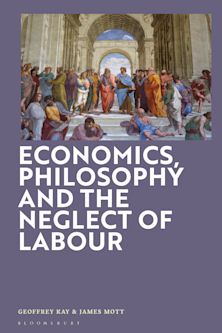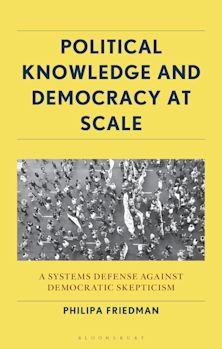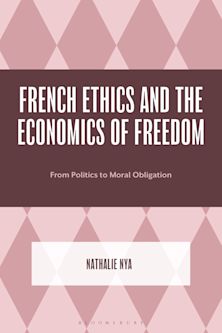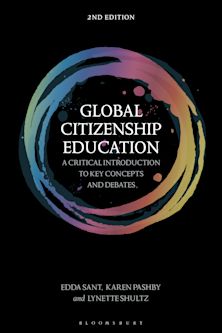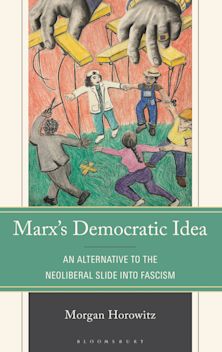- Home
- ACADEMIC
- Philosophy
- Social and Political Philosophy
- Difference and Dissent
Difference and Dissent
Theories of Toleration in Medieval and Early Modern Europe
Cary J. Nederman (Anthology Editor) , John Christian Laursen (Anthology Editor) , Glenn Burgess (Contributor) , Paul J. Cornish (Contributor) , Kate Langdon Forhan (Contributor) , E J. Furcha (Contributor) , Stephen Lahey (Contributor) , John Christian Laursen (Contributor) , Cary J. Nederman (Contributor) , Gary Remer (Contributor) , William Walker (Contributor) , Simone Zurbuchen (Contributor)
- Textbook
Difference and Dissent
Theories of Toleration in Medieval and Early Modern Europe
Cary J. Nederman (Anthology Editor) , John Christian Laursen (Anthology Editor) , Glenn Burgess (Contributor) , Paul J. Cornish (Contributor) , Kate Langdon Forhan (Contributor) , E J. Furcha (Contributor) , Stephen Lahey (Contributor) , John Christian Laursen (Contributor) , Cary J. Nederman (Contributor) , Gary Remer (Contributor) , William Walker (Contributor) , Simone Zurbuchen (Contributor)
- Textbook
For information on how we process your data, read our Privacy Policy
Thank you. We will email you when this book is available to order
Buy from Bloomsbury eTextBooks
You are now leaving the Bloomsbury Publishing website. Your eBook purchase will be with our partner https://www.vitalsource.com.
Your credit card statement will show this purchase originating from VitalSource Technologies. They will also provide any technical assistance you might require.
You must sign in to add this item to your wishlist. Please sign in or create an account
Description
This innovative collection points to the need for a reevaluation of the origins of toleration theory. Philosophers, intellectual historians, and political theorists have assumed that the development of the theory of toleration has been a product of the modern world, and John Locke is usually regarded as the first theorist of toleration. The contributors to Difference and Dissent, however, discuss a range of conceptual positions that were employed by medieval and early modern thinkers to support a theory of toleration, and question the claim that Locke's theory of toleration was as original or philosophically adequate as his adherents have asserted.
Table of Contents
Chapter 2 Difference and Dissent: Introduction
Chapter 3 Liberty, Community, and Toleration: Freedom and Function in Medieval Political Thought
Chapter 4 Toleration in the Theology and Social Thought of John Wyclif
Chapter 5 Respect, Interdependence, Virtue: A Medieval Theory of Toleration in the Works of Christine de Pizan
Chapter 6 "Turks and Heathen Are Our Kin": The Notion of Tolerance in the Works of Hans Denck and Sebastian Franck
Chapter 7 Spanish Thomism and the American Indians: Vitoria and Las Casas on the Toleration of Cultural Difference
Chapter 8 Bodin's Pluralistic Theory of Toleration
Chapter 9 Thomas Hobbes: Religious Toleration or Religious Indifference?
Chapter 10 Samuel Pufendorf's Concept of Toleration
Chapter 11 Spinoza on Toleration: Arming the State and Reining in the Magistrate
Chapter 12 Force, Metaphor, and Persuasion in Locke's A Letter Concerning Toleration
Chapter 13 Index
Product details
| Published | 30 Dec 1996 |
|---|---|
| Format | Ebook (Epub & Mobi) |
| Edition | 1st |
| Extent | 272 |
| ISBN | 9780742576988 |
| Imprint | Rowman & Littlefield Publishers |
| Publisher | Bloomsbury Publishing |
About the contributors
Reviews
-
...this book offers important reformulations of tolerance. ...by demonstrating the broad array of theories of tolerance, this book opens promising paths of inquiry for political philosophy.....
Pascal Massie, Vanderbilt University, Albert E. Gunn and Staff
-
Nederman shows that there is a wide 'diversity of intellectual frameworks that have generated viable defenses of toleration'.
Theolody Digest
-
The overall contribution of Difference and Dissent is to recognize communitarian and natural law foundations of toleration theory and to encourage us to ask percislely whom a theorist is tolerating, whethers/he intends temporary concordance or permanent toleration and to whom the theorist is not extending toleration.
Maryanne Cline Horowitz, Occidental College & UC of Los Angeles, American Political Science Review
-
All the essays inDifference and Dissentare informative and intellectually stimulating.
Hilmar M. Pabel, Simon Frasher University, H-Net: Humanities and Social Science Reviews Online
-
The editors of this collection of lively, interesting, and accessible essays are said to be congratulated on the coherence created by the common focus uniting the contributions. . . . This is clearly a quite different defence of toleration from that which makes free speech an inalienable individual right. . . . [offers] some alternatives to the conventional way of thinking about tolerance and [gives] us some practice in thinking about it in ways and contexts different fom the dominant modern narrative.
Ruth Abbey, Political Theory, University of Notre Dame, Journal Of Religious History
-
This volume is a happy antidote to those who think that the discussion of toleration in the modern world starts with John Locke. This collection brings together eleven essays that discuss kinds of toleration theories from the middle ages through the seventeenth century in different cultures, indicating that the idea of toleration has a much richer and interesting history than we are usually told about.
Richard H. Popkin, editor of the Columbia History of Western Philosophy












